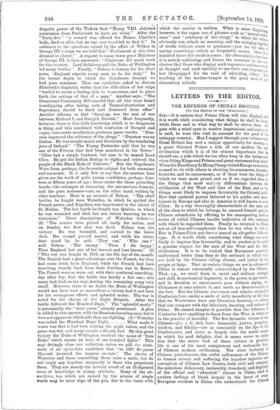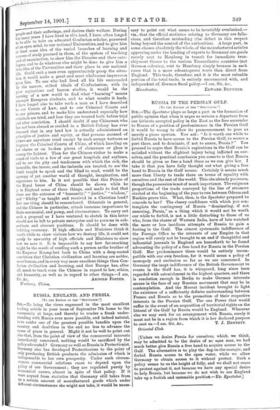LETTERS TO THE EDITOR.
THE EMPEROR OF CHINA'S BROTHER.
[To THE EDITOR OP THE "SPECTATOR:1
Sin,—It is certain that Prince Chun will visit England, and it is worth while considering what things he shall be shown while there and in what way he shall be shown them. ide goes with a mind open to receive impressions, and anxious, it is said, to turn this visit to account for the good of his unhappy country. May I suggest through your columns that Great Britain has now a unique opportunity for showing to a great Oriental Prince a side of our modern life and civilisation which it is of the utmost importance that be should see, a side which we too often keep in the background when feting Kings and Princes and great statesmen from Asia? When his Excellency Li Hung Chang visited Europe each nation seemed to vie with others in showing its armaments, its mann. factories, and its amusements, as if these were the things of which we were most proud, and as if we regarded these as the things that most entirely differentiate between the civilisation of the West and that of the East, and as the things most likely to impress favourably the Oriental mind. How that eminent person behaved to his guides and enter. tainers in Europe and also in America is well known to us in China. In a way thoroughly characteristic of the man and of the class to which he belongs, he amused himself and his Chinese attendants by offering to his unsuspecting hosts a series of veiled Chinese insults indicative of the contempt with which he regarded them. Finally he returned to China not at all less self-complacent than he was when he left it. But in Prince Chun you have a man of an altogether different type. It is worth while considering what things are most likely to impress him favourably, and to awaken in his mind a genuine respect for the men of the West and for their civilisation. It is to be wished that Europeans generally understood better than they do the estimate in which they are held by the Chinese ruling classes, and indeed by the people at large. That in certain things we are in advance of China is almost universally acknowledged by the Chinese. That, e.g., we excel them in naval and military strength and skill, in mechanical ingenuity, in the power to get wealth, and in devotion to amusements goes without saying; the Chinaman at once admits it, and needs no demonstration of the fact. But the Chinese statesman and scholar, steeped in Confucian lore, smiles a smile of lofty incredulity at the idea that we Westerners have any literature, learning, cr culture that can compare with the literature, learning, and culture of China. He cannot imagine it possible that the followers of Confucius have anything to learn from the West in ethics or in the practice of morality. The five favourite virtues of the Chinese—jgn, i, Li, chih, lain: humanity, justice, propriety, wisdom, and fidelity—are so constantly on the lips of the Confucianist, and enter so largely into the moral essay' in which his soul delights, that it seems never to stnke him that the entire lack of these virtues in practical life is one of the most conspicuous and noticeable facts of Chinese modern civilisation. The utter barbarity Of Chinese punishments, the awful callousness of the Chinese to human misery and suffering, the hopeless injustice .and corruption of Chinese Law Courts, both civil and criminal,
. the notorious dishonesty, insincerity, treachery, and duplielti of the official and " educated" classes in China, tend to awaken feelings of blank despair in the heart of !lel European resident in China who understands the Chios°
people and their sufferings, and desires their welfare. During the many years I have lived in this land, I have often longed to be able to take an educated Confucian scholar, possessed of an open mind, to our national Universities, and to give him at least some idea of the varied branches of learning and courses of study pursued in them, of the system of teaching and of examination, to show him the libraries and their cata- logues, and to do whatever else might be done to give him a true idea of the Universities and their place in our national life, Could such a man even approximately grasp the situa- tion it would make a great and most wholesome impression upon him. To one who had lived all his life surrounded Fr the narrow, stilted ideals of Confucianism, with its poor aspirations and barren studies, it would be the opening of a new world to find what "learning" means amongst European students, and to what results it leads. I have longed also to take such a man as I have described to our Courts of Law, and to our Criminal Courts and to our prisons, and to make him understand especially how criminals are tried, and how they are treated both before trial and after conviction. I should doubt if any Chinaman who has not been abroad or resided in a British Colony has ever dreamed that in any land law is actually administered on principles of justice and equity, or that persons accused of crimes are anywhere tried except by such savage tortures as disgrace the Criminal Courts of China, of which kneeling on hot chains or on broken pieces of chinaware or glass is among the lightest. Then for the Chinese visitor to make a round of visits to a few of our great hospitals and asylums, and to see the pity and tenderness with which the sick, the incurable, the insane, and the imbecile are treated, to see'the dumb taught to speak and the blind to read, would be the opening of yet another world of thought, imagination, and experience to him. Is it not possible that this Prince of the Royal house of China should be shown while he is in England some of these things, and made to feel that these are the outcome of "humanity," "justice," "wisdom," and " fidelity " as taught and received in a Christian land? But one thing should be remembered. Orientals in general, and the Chinese in particular, attach immense importance to State ceremonial, and pomp, and circumstance. To carry out such a proposal as I have ventured to sketch in this letter should not be left to private enterprise and to persons in sub- ordinate and obscure positions. It should be done with befitting ceremony. If high officials and Ministers think it worth while to show visitors how we destroy life, it could not surely be unworthy of high officials and Ministers to show how we save it. It is impossible to say how far-reaching might be the result of sending such a person as the brother of the Emperor ICuang-hsii back to China with a deep.rooted conviction that Christian civilisation and learning are nobler, more human, and in every way more excellent things than Con- fucian civilisation and learning, and that Europe has, after all, much to teach even the Chinese in regard to law, ethics, and humanity, as well as in regard to other things.—I am, Sir, &e., 'Yachting, China. ARNOLD FOSTER.







































 Previous page
Previous page